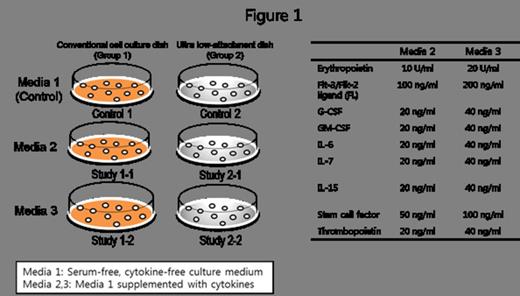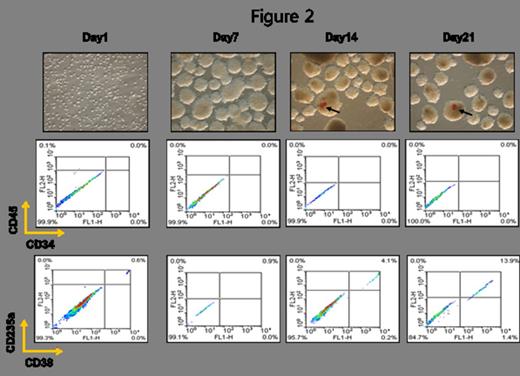Abstract
Placenta is a specialized organ which has a property of fetal and adult tissues simultaneously. Mesenchymal stem cell and hematopoietic stem cells have been founded in the parenchyma of placenta tissue contributed by fetal side. Recently, it was reported that placenta is a major hematopoietic organ contributing to both generation and expansion of multipotent hematopoietic stem and progenitor cells. We hypothesized that hematopoietic stem cells in placenta might be originated from another placental stem cells which has been so-called “placenta mesenchymal stem cells”. To prove this hypothesis, this study is designed to induce in vitro differentiation of placental stem cells into the hematopoietic stem cells without genetic transduction.
Placental stem cells was obtained from surgically isolated placental chorionic plates from healthy women who had undergone abortion at 6-8 weeks of gestation. To prevent the contamination of hematopoietic stem cells, CD34-CD44+ cells were purified by flowcytometric isolation. After mesenchymal differentiation potential was identified in these cells by induction of adipogenic and osteogenic differentiation, they were cultured in vitro with serum-free media including cytokine cocktail which was known to induce differentiation of embryonic stem cells into hematopoietic lineage (erythropoietin, Flt-3/Flk-2 ligand, G-CSF, GM-CSF, IL-6/7/15, stem cell factor, and thrombopoietin). In vitro differentiation was performed in conventional cell culture dish (group 1) and Ultra-low attachment dish (group2) for 3 weeks, respectively (Figure 1). Expression of hematopoietic stem and progenitor cell markers were analyzed at every 1 week.
In group 1 (conventional cell culture dish), no hematopoietic differentiation was identified regardless of the concentrations of cytokine cocktail. In group 2 (Ultra-low attachment dish), expression of pan-hematopoietic markers, CD34 and CD45 was also not observed. However, after 2 weeks of differentiation induction, red cells aggregates and expression of erythroid-lineage markers (CD235a and CD38) were detected in cells cultured using high concentration cytokines (Media 3 in Figure 1). The proportion of cells expressing erythroid-lineage markers became increased during in vitro differentiation (Figure 2).
Although this study failed to show the differentiation of placenta-derived stem cells into hematopoietic stem cells, the results demonstrated that placenta-derived stem cells could be differentiated into the erythroid lineage under certain condition (i.e. liquid culture + high concentration cytokines). Therefore, placenta-derived stem cells which have been so-called “placenta mesenchymal stem cells” is considered to be a distinct stem cell population including property of erythroid progenitor cells.
No relevant conflicts of interest to declare.
Author notes
Asterisk with author names denotes non-ASH members.



